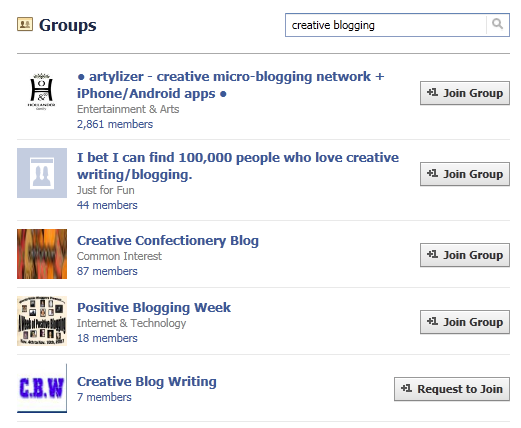2.5: How Can Facebook Help to Promote My Web Writing?
- Page ID
- 42992
\( \newcommand{\vecs}[1]{\overset { \scriptstyle \rightharpoonup} {\mathbf{#1}} } \)
\( \newcommand{\vecd}[1]{\overset{-\!-\!\rightharpoonup}{\vphantom{a}\smash {#1}}} \)
\( \newcommand{\id}{\mathrm{id}}\) \( \newcommand{\Span}{\mathrm{span}}\)
( \newcommand{\kernel}{\mathrm{null}\,}\) \( \newcommand{\range}{\mathrm{range}\,}\)
\( \newcommand{\RealPart}{\mathrm{Re}}\) \( \newcommand{\ImaginaryPart}{\mathrm{Im}}\)
\( \newcommand{\Argument}{\mathrm{Arg}}\) \( \newcommand{\norm}[1]{\| #1 \|}\)
\( \newcommand{\inner}[2]{\langle #1, #2 \rangle}\)
\( \newcommand{\Span}{\mathrm{span}}\)
\( \newcommand{\id}{\mathrm{id}}\)
\( \newcommand{\Span}{\mathrm{span}}\)
\( \newcommand{\kernel}{\mathrm{null}\,}\)
\( \newcommand{\range}{\mathrm{range}\,}\)
\( \newcommand{\RealPart}{\mathrm{Re}}\)
\( \newcommand{\ImaginaryPart}{\mathrm{Im}}\)
\( \newcommand{\Argument}{\mathrm{Arg}}\)
\( \newcommand{\norm}[1]{\| #1 \|}\)
\( \newcommand{\inner}[2]{\langle #1, #2 \rangle}\)
\( \newcommand{\Span}{\mathrm{span}}\) \( \newcommand{\AA}{\unicode[.8,0]{x212B}}\)
\( \newcommand{\vectorA}[1]{\vec{#1}} % arrow\)
\( \newcommand{\vectorAt}[1]{\vec{\text{#1}}} % arrow\)
\( \newcommand{\vectorB}[1]{\overset { \scriptstyle \rightharpoonup} {\mathbf{#1}} } \)
\( \newcommand{\vectorC}[1]{\textbf{#1}} \)
\( \newcommand{\vectorD}[1]{\overrightarrow{#1}} \)
\( \newcommand{\vectorDt}[1]{\overrightarrow{\text{#1}}} \)
\( \newcommand{\vectE}[1]{\overset{-\!-\!\rightharpoonup}{\vphantom{a}\smash{\mathbf {#1}}}} \)
\( \newcommand{\vecs}[1]{\overset { \scriptstyle \rightharpoonup} {\mathbf{#1}} } \)
\( \newcommand{\vecd}[1]{\overset{-\!-\!\rightharpoonup}{\vphantom{a}\smash {#1}}} \)
I have a bunch of “friends” on Facebook. How can I take advantage of these nitwits to help promote my writing?
In many cases, your friends and family will (hopefully) be the ones most likely to want to see your work. After all, they have a personal investment in you and would like to see you succeed.
So, announcing your work on Facebook and posting links on your wall is a good way to start getting exposure.
That may sound lame at first—you want a big audience of strangers, not your mom, cousin, and that friend from kindergarten you just reconnected with. Nevertheless, you now have the world’s largest social network working for you. If your mom posts to her friends, and some of them post to theirs, pretty soon you have dozens or hundreds of people checking your work out.
Of course, if you’re trying to keep your work anonymous, steer clear of Facebook. Even the old “I found this cool thing online” might backfire, since you’re sending it to the very people most able to know it’s really you.

Figure 8. Use Facebook’s search bar to find any existing groups dedicated to your topic. You can then join them and read what everyone’s talking about. If no group exists, you can create your own group and then invite anyone you think might be interested to join.
You can also save time by using Facebook apps that will coordinate your efforts to let the world know about your most recent stuff. For instance, the Facebook app Networked Blogs can be set up to automatically update your Facebook and Twitter accounts every time you publish a new blog post, and you can set things up so every time you Tweet, it shows up on Facebook (or vice versa).
Your first step for promoting your stuff on Facebook should be to find an existing group of users who are already interested in the topic you’re writing about.
Connecting with like-minded people is a sure way to not only grow your audience but also improve your skills. Don’t just pester people to look at your stuff. Instead, spend time browsing their work, offering feedback (positive only). Be friendly and supportive at all times. As you gain the group’s respect, you’ll also be encouraging them to take your work more seriously and give you feedback on it.


